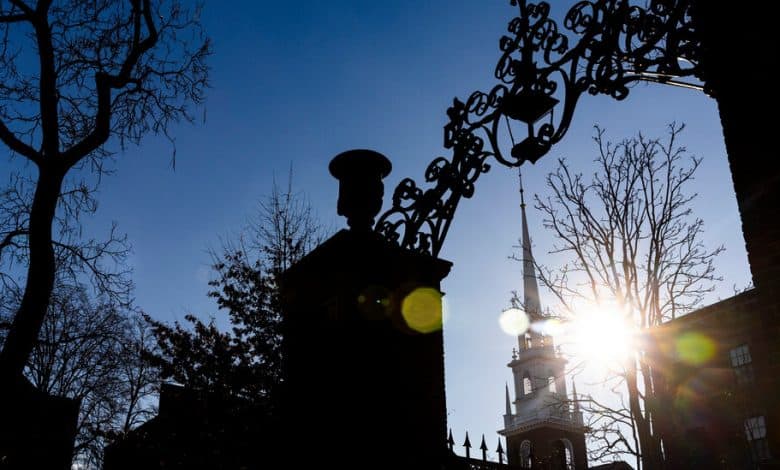Claudine Gay: What Just Happened at Harvard Is Bigger Than Me

On Tuesday, I made the wrenching but necessary decision to resign as Harvard’s president. For weeks, both I and the institution to which I’ve devoted my professional life have been under attack. My character and intelligence have been impugned. My commitment to fighting antisemitism has been questioned. My inbox has been flooded with invective, including death threats. I’ve been called the N-word more times than I care to count.
My hope is that by stepping down I will deny demagogues the opportunity to further weaponize my presidency in their campaign to undermine the ideals animating Harvard since its founding: excellence, openness, independence, truth.
As I depart, I must offer a few words of warning. The campaign against me was about more than one university and one leader. This was merely a single skirmish in a broader war to unravel public faith in pillars of American society. Campaigns of this kind often start with attacks on education and expertise, because these are the tools that best equip communities to see through propaganda. But such campaigns don’t end there. Trusted institutions of all types — from public health agencies to news organizations — will continue to fall victim to coordinated attempts to undermine their legitimacy and ruin their leaders’ credibility. For the opportunists driving cynicism about our institutions, no single victory or toppled leader exhausts their zeal.
Yes, I made mistakes. In my initial response to the atrocities of Oct. 7, I should have stated more forcefully what all people of good conscience know: Hamas is a terrorist organization that seeks to eradicate the Jewish state. And at a congressional hearing last month, I fell into a well-laid trap. I neglected to clearly articulate that calls for the genocide of Jewish people are abhorrent and unacceptable and that I would use every tool at my disposal to protect students from that kind of hate.
Most recently, the attacks have focused on my scholarship. My critics found instances in my academic writings where some material duplicated other scholars’ language, without proper attribution. I believe all scholars deserve full and appropriate credit for their work. When I learned of these errors, I promptly requested corrections from the journals in which the flagged articles were published, consistent with how I have seen similar faculty cases handled at Harvard.
I have never misrepresented my research findings, nor have I ever claimed credit for the research of others. Moreover, the citation errors should not obscure a fundamental truth: I proudly stand by my work and its impact on the field.
Despite the obsessive scrutiny of my peer-reviewed writings, few have commented on the substance of my scholarship, which focuses on the significance of minority office holding in American politics. My research marshaled concrete evidence to show that when historically marginalized communities gain a meaningful voice in the halls of power, it signals an open door where before many saw only barriers. And that, in turn, strengthens our democracy.
Throughout this work, I asked questions that had not been asked, used then-cutting-edge quantitative research methods and established a new understanding of representation in American politics. This work was published in the nation’s top political science journals and spawned important research by other scholars.
Never did I imagine needing to defend decades-old and broadly respected research, but the past several weeks have laid waste to truth. Those who had relentlessly campaigned to oust me since the fall often trafficked in lies and ad hominem insults, not reasoned argument. They recycled tired racial stereotypes about Black talent and temperament. They pushed a false narrative of indifference and incompetence.
It is not lost on me that I make an ideal canvas for projecting every anxiety about the generational and demographic changes unfolding on American campuses: a Black woman selected to lead a storied institution. Someone who views diversity as a source of institutional strength and dynamism. Someone who has advocated a modern curriculum that spans from the frontier of quantum science to the long-neglected history of Asian Americans. Someone who believes that a daughter of Haitian immigrants has something to offer to the nation’s oldest university.
I still believe that. As I return to teaching and scholarship, I will continue to champion access and opportunity, and I will bring to my work the virtue I discussed in the speech I delivered at my presidential inauguration: courage. Because it is courage that has buoyed me throughout my career and it is courage that is needed to stand up to those who seek to undermine what makes universities unique in American life.
Having now seen how quickly the truth can become a casualty amid controversy, I’d urge a broader caution: At tense moments, every one of us must be more skeptical than ever of the loudest and most extreme voices in our culture, however well organized or well connected they might be. Too often they are pursuing self-serving agendas that should be met with more questions and less credulity.
College campuses in our country must remain places where students can learn, share and grow together, not spaces where proxy battles and political grandstanding take root. Universities must remain independent venues where courage and reason unite to advance truth, no matter what forces set against them.
Claudine Gay is a former president of Harvard University, where she is a professor of government and of African and African American studies.
The Times is committed to publishing a diversity of letters to the editor. We’d like to hear what you think about this or any of our articles. Here are some tips. And here’s our email: [email protected].
Follow the New York Times Opinion section on Facebook, Instagram, TikTok, X and Threads.
